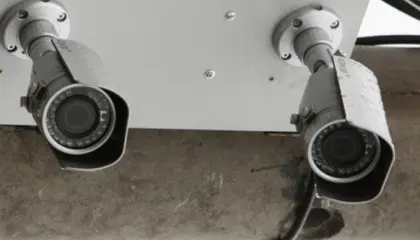Unlike European and American authorities, who have banned the use of surveillance cameras from companies that work with the Chinese military as they present risks to national security, Ukraine has not. The result? Russia and China have access to information that they are collecting, openly, via surveillance cameras across Ukraine.
On the night of May 16, Kyiv experienced one of the most powerful missile attacks of the war. To overload the resource of the capital’s air defense, Russia launched attack drones, hypersonic Kinzhal, cruise missiles from the ships of the Black Sea Fleet and ballistic missiles from land. The city fought back with all the available weapons, and in the sky, explosions of air defense missiles blossomed across the sky.
- Find the most up-to-date war in ukraine update in the Kyiv Post's daily news items for today.
- Find the newest Ukraine news pieces that came out today.
Within hours, videos from Kyiv, taken by online surveillance cameras, appeared on Russian Telegram channels. The clips revealed important information about the capital’s anti-aircraft defense: the order of application, the number and type of air defense missiles used, and the approximate launch areas.
Since Russian satellites are unable to continuously scan strike areas, video cameras with internet access are the enemy’s best means of gathering intelligence and correcting damage.
What do the cameras that Russia uses to gather intelligence in Ukraine have in common?
Most online cameras installed in Ukraine are Hikvision and Dahua devices – Chinese state-owned companies.

Zelensky’s Top General Syrsky Admits Ukraine’s Army Faces Challenges – But Says Fixes Are Coming
Chinese business in the intelligence service of the People’s Republic of China
In February 2022 FBI Director Christopher Wray said that his agency opens a new Chinese-related counterintelligence investigation every 12 hours on average and now has more than 2,000 such cases.
The special services of the People’s Republic of China operate in a radically different way than Western ones, in terms of nature and scale. The entire population, all Chinese diaspora, and all suitable technical means, including Chinese-made electronic systems, are used to search for information.
“There’s no more ominous prospect in today’s world than the ability of a hostile government to compromise your infrastructure and individual devices,” Wray said.
“If Chinese companies gain unrestricted access to telecommunications infrastructure, they will be able to collect any information that passes through the devices and networks.
“Even worse, they have no choice but to turn it over to the Chinese government if asked. There is simply no privacy protection in China.”
The work of the PRC services against their adversaries is facilitated by Chinese dominance in the world market of video surveillance systems. With annual revenues of $10 billion and $5 billion, respectively, Hikvision and Dahua lead the financial ranking of security companies in the Security 50.
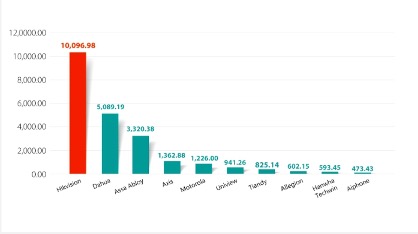
(Rating of Security 50 in 2022 р.)
According to the Top10VPN group, there are at least 6.3 million networks of devices manufactured by Hikvision and Dahua operating outside China. Up to 24 cameras can be combined in each network.
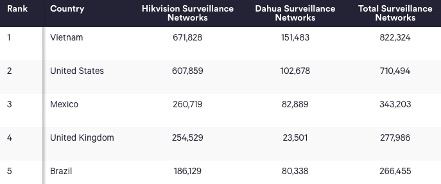
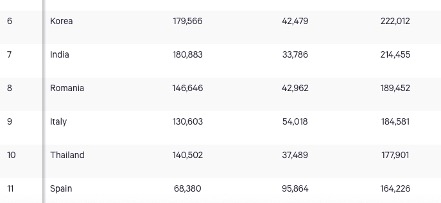
(List of 11 countries outside of China where the most Dahua and Hikvision surveillance camera networks were detected in 2021 according to the Top10VPN group)
The sophistication of the idea is impressive. People use their own money to buy surveillance and listening devices and place them in the very places where security and privacy are most valuable to them.
Meanwhile, Chinese manufacturers are opening the possibility of access to such information for third parties.
● In 2016, a large-scale DDoS attack was carried out on the website of American journalist and cyber security specialist Brian Krebs using a botnet - a network of devices that were remotely controlled by attackers. According to the investigation, the most among them were Dahua cameras and video recorders.
● In 2017, a backdoor was discovered in many models of Dahua cameras and video recorders - an algorithm defect built in by the developer, which allows unauthorized access. Backdoor allowed remote loading of a database of usernames and passwords through a browser without authorization.
● In 2017, the Cybersecurity and Infrastructure Protection Agency, which is a division of the US Department of Homeland Security, assigned Hikvision cameras the worst possible rating for resistance to third-party access.
● In 2022, security researchers discovered more than 80,000 Hikvision online cameras exposed to a critical vulnerability, which allowed the devices to be controlled using messages sent to a vulnerable web server.
● Also, last year, the sale of credentials of vulnerable Hikvision cameras was recorded on Russian forums. Hackers could use this information to gain access to the devices and then attack the networks of organizations where they are installed.
Hikvision and Dahua cameras seemingly pop up whenever there is significant hacking.
Who is spying on the Armed Forces?
China’s 2017 National Security Law requires organizations, private companies, and citizens to cooperate with intelligence agencies upon their request.
In the case of manufacturers of video surveillance systems, requests are not required - they work under the direct control of the Chinese authorities. The manufacturers are more than 41 percent owned by the Chinese Government and headed by Chen Zongyang, a member of the Chinese Parliament.
It’s perhaps no surprise that the US Department of Defense has included the company in its list of Chinese military companies.
According to the BBC, the recently leaked Pentagon documents specifically mention Hikvision’s partnership with “Chinese intelligence agencies.” The documents state that the company is now trying to put the names of other brands on its cameras, such as those of its distributors.
The goal is to bypass the restrictions and spy on the buildings of the federal departments of the United States, something that would be disastrous as the companies receive billions from China’s budget.
The world opposes Chinese spying
Hikvision and Dahua are forced to keep their own name off video surveillance equipment due to restrictions and bans implemented by leading Western countries due to the companies’ connection with China's special services.
In 2018, the US Congress passed the John McCain National Defense Authorization Act (NDAA), section 889 which provided for the prohibition of certain services and types of equipment in the field of telecommunications and video surveillance. Since then, federal agencies have been barred from purchasing Hikvision and Dahua equipment and from entering official relationships with companies and organizations that use their cameras.
In 2021, the Federal Communications Commission (FCC) published a list of communications equipment manufacturers that pose a threat to US national security. Dahua and Hikvision were among the five Chinese companies on the list. Within months, President Biden signed the Secure Equipment Act, which prohibited the FCC from issuing future licenses for Hikvision and Dahua devices.
Almost 90 percent of the members of the European Parliament voted to ban the use of Hikvision cameras on official premises because the manufacturer is involved in repression of the Uyghurs.
In 2022, as part of a campaign to limit Chinese military companies' access to modern technologies, the United States imposed controls on Dahua’s chip exports. At the same time, the British government banned public authorities from installing Hikvision and Dahua surveillance cameras.
In 2023, a similar ban on the installation of Hikvision and Dahua devices by public authorities was approved by the Australian government.
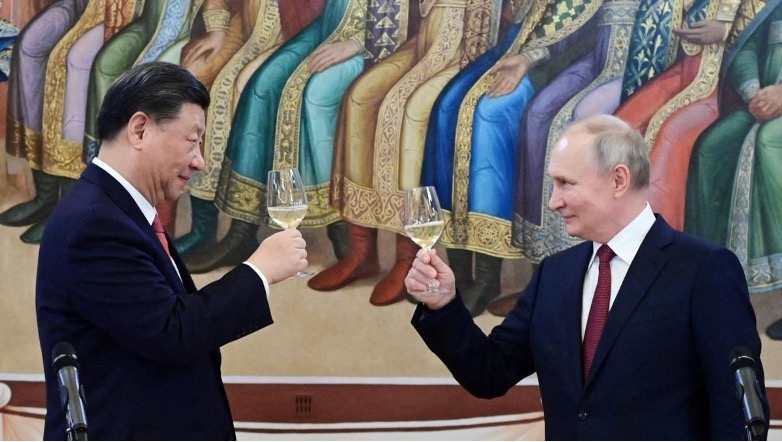
Support of Russian aggression against Ukraine
While verbally supporting the sovereignty and territorial integrity of Ukraine, China is a reliable backer of the Russian Federation. In particular, the aggressor is supplied without restrictions with Chinese dual-purpose products that can be used for military purposes.
There are no pleasant surprises in the field of video surveillance either. Western brands Axis, Hanwha, Panasonic, Motorola, IBM, Milestone left the Russian market, which only fueled the activity of their Chinese competitors.
With the start of a full-scale war in 2022, the revenue of Hikvision’s official representative office in the Russian Federation – Hikvision LLC – increased by 42 percent to 10.9 billion rubles ($135 million). Net profit increased by 1,526% to 1.26 billion rubles ($15.6 million).
The company's staff has been doubled to meet the high demand from Russians for cameras that can be installed in UAVs, as well as ready-made drones, thermal imagers and anti-drone guns.
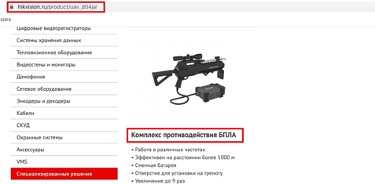
(Information from the official website of Hikvision in the Russian Federation about the sale of an anti-drone gun)
The Dahua business, represented by Dahua Technologies Rus LLC, is also flourishing in the Russian Federation. According to ImportGenius, in March-April 2022, the company imported more than 3 tons of equipment from China, primarily video cameras. Delivery of drones, thermal imagers and related components continues.
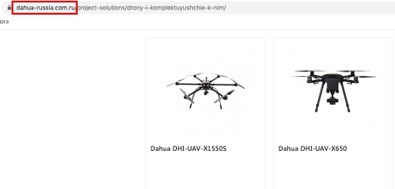
(Information from the official website of Dahua in the Russian Federation about the sale of drones)
Reflecting on the matters discussed, the prevailing situation in Ukraine indeed provokes deep contemplation.
The public procurement platform, Prozorro, records the mention of state organizations, military units, and infrastructure facilities engaging with Hikvision and Dahua cameras over 3,000 times in last seven years.
Municipalities, governmental bodies, and critical infrastructures find themselves prompted to reexamine their safety measures, channeling an array of watchful lenses toward their most exposed sectors.
However, the lingering question remains: does Ukraine recognize that it might not retain exclusive oversight of these ever-watchful eyes? For now, the answer remains shrouded in uncertainty.
Oleksii Kupriienko is part of the “Don't Fund Russian Army” initiative which aims to exclude global businesses of Russia. He is the Founder & CEO of “Underdog” the UnLawyers
You can also highlight the text and press Ctrl + Enter


